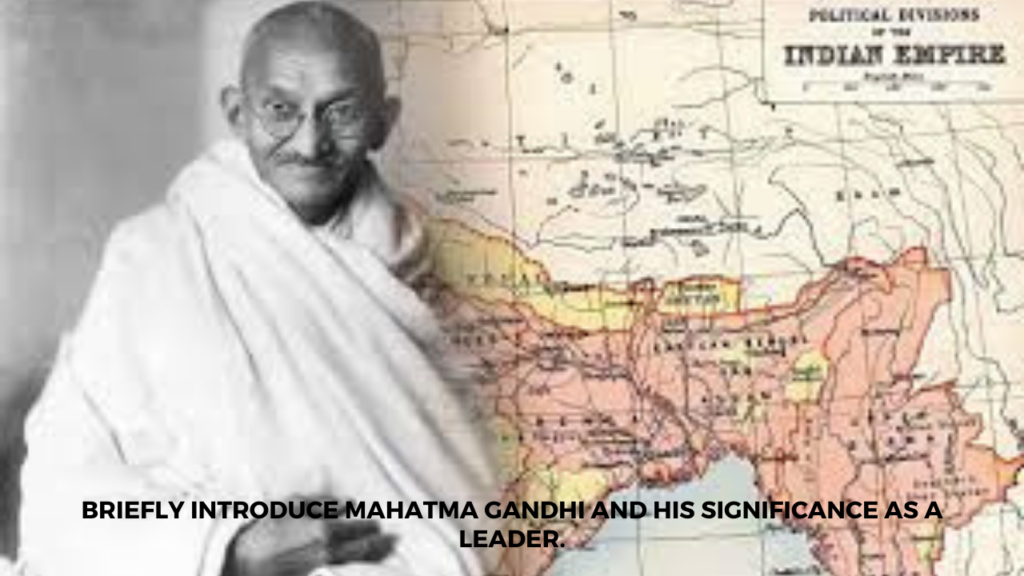A revered figure in India’s freedom struggle, Mahatma Gandhi remains an influential leader with a profound impact on the world. His principles of non-violence, civil disobedience and social justice have left an indelible mark on history. In this comprehensive blog post, we will trace the remarkable history and biography of Mahatma Gandhi, detailing his early life, transformative experiences in South Africa, the birth of Satyagraha, his leadership in India’s independence movement, and his enduring legacy. Join us as we embark on the extraordinary journey of this remarkable man.

Early Life and Education:
Born on October 2, 1869, in the coastal city of Porbandar in Gujarat, India, Mohandas Karamchand Gandhi belonged to a middle-class Hindu family, which instilled in him the values of truth, simplicity and non-violence. Gandhi received his early education in India and later studied law in London, where he qualified as a barrister in 1891. These formative years laid the groundwork for his future roles as a lawyer and activist.
Mahatma Gandhi Experience in South Africa:
A transformative change in Mahatma Gandhi’s life came when he moved to South Africa in 1893 to work as a lawyer. During his time there, he personally experienced the harsh realities of racial discrimination. Faced with numerous instances of injustice and humiliation, Gandhi resolved to fight such oppression. He became actively involved in various campaigns advocating the rights of the Indian community, which eventually resulted in the establishment of the Natal Indian Congress in 1894. These experiences deeply shaped his thinking, strengthened his commitment to social justice, and fueled his pursuit of nonviolent resistance. ,
Mahatma Gandhi Birth of Satyagraha:
Upon his return to India in 1915, Gandhi emerged as a prominent leader within the Indian National Congress, a major political party advocating independence. It was during this period that he introduced the concept of Satyagraha as a powerful tool for social change. Satyagraha, meaning “force of truth” or “spiritual power”, emphasized the use of nonviolence and civil disobedience to challenge oppressive systems. Mahatma Gandhi firmly believed that individuals had the moral courage and ability to oppose injustice through personal sacrifice. Satyagraha became the basis of Gandhiji’s philosophy and method of his overall activism.
Leadership in India’s Freedom Movement:
Mahatma Gandhi’ leadership during India’s independence movement was characterized by an unwavering commitment to non-violence and an inclusive approach. He led many campaigns and movements, uniting millions of Indians in the fight against the British colonial rule. One of the most iconic events was the Salt March in 1930 when Gandhi and thousands of Indians walked 240 miles to produce salt openly challenging the British salt monopoly. This act of civil disobedience thrilled the nation and garnered widespread support for the independence movement.
Gandhiji’s leadership style emphasized inclusiveness, bridging the gap between the various religious, linguistic and caste communities in India. He advocated a society where all individuals are treated with dignity and respect, regardless of their background. His efforts resulted in significant socio-political changes, such as the abolition of untouchability and the advancement of women’s rights.
Legacy and Influence:
Mahatma Gandhi’s legacy extends far beyond India’s borders. His philosophy of nonviolence and principles of truth, simplicity and self-discipline have influenced countless individuals and movements around the world. His teachings continue to inspire social and political activists, including such well-known figures as Martin Luther King Jr., Nelson Mandela, and Aung San Suu Kyi, who adopted his principles of nonviolent resistance in their respective struggles for equality and justice.
Furthermore, Gandhi’s vision for India as a pluralistic and inclusive nation remains relevant even in the modern world. His emphasis on communal harmony, sustainable development and equitable distribution of resources serves as a guide to deal with contemporary challenges.
conclusion:
The life and work of Mahatma Gandhi is a testimony to the power of peaceful resistance and the search for truth. From his early experiences in South Africa to his leadership in India’s independence movement, Gandhi’s unwavering commitment to nonviolence and social justice changed the course of history. His teachings continue to inspire generations, reminding us that positive change can be achieved through peaceful means. Gandhi’s legacy shines as a beacon of hope, guiding humanity towards a more just and compassionate world.